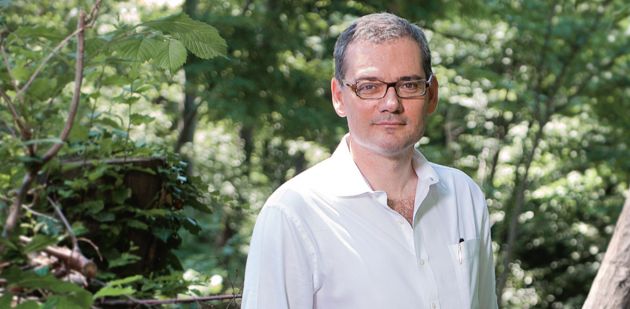Things have changed: in the case of cancer, the hope is not simply to delay the inevitable – but to cure it. George Coukos, one of the world’s leading specialists in immunotherapy, talks about the current state of cancer research.

IN VIVO In 1971, US President Richard Nixon declared war on cancer. Forty years later, the war is still not won.
GEORGE COUKOS No, of course not. But spectacular results have been obtained with new approaches such as targeted therapy and immunotherapy. And the combination of different treatments – drugs, chemotherapy and radiotherapy – sometimes multiplies the beneficial effects.
IV Your field, immunotherapy, is today hailed as the most promising approach.
GK We have made enormous progress. We now know that helping the body to defend itself can have a very important impact on fighting disease. It is possible, for example, to conduct surgery to extract white blood cells (the cells that make up our immune defence system), boost their efficiency and re-inject them into the patient’s body. This technique makes it possible to act even in cases that were previously considered hopeless, such as in patients with metastatic melanoma. To have patients in remission for more than five years after diagnosis is truly a miracle.
IV Why is there still only a handful of immunotherapy treatments available?
GK Researchers first focused their attention on a difficult target: therapeutic vaccines that seek to educate the immune defence system by putting it into contact with markers related to cancer. We also discovered the mechanisms used by cancer to neutralise the defences of the human body, and we recently managed to thwart this strategy and neutralise it. It’s a real game of chess.
IV Have the early promises of genetics and personalized medicine been fulfilled?
GK Treatment programmes sometimes prove to be less effective than predicted and their extremely high cost is not well accepted. One shouldn’t be so pessimistic. There are dozens of targeted treatments that have been developed recently, and they are saving lives. Cancer is a complex and heterogeneous disease. Treatment does not always work for everyone. It is crucial to first analyse the cancer to determine its type.
We will thus be able to recruit participants far more quickly, which can save lives and also help the therapies mature more quickly.
IV Every day, the papers announce encouraging results for experimental therapies, but in general it takes several years before the treatments are approved for use. Are patients really benefiting from these developments?
GK This is the main objective of so-called translational research centres that bring together researchers and oncologists in a radical manner. Together they can then rapidly identify those patients who could benefit from a new therapy and recruit them for a clinical trial. This is the strategy adopted by the Swiss Cancer Centre, launched in May 2013. We will thus be able to recruit participants far more quickly, which can save lives and also help the therapies mature more quickly.
IV How long does it take today before a new treatment is used on patients?
GK At best, we can have the first clinical trials after five years and the authorization to market a treatment for all patients after ten years.
IV Can Swiss patients participate in clinical trials abroad to test new molecules?
GK This is possible, but for the moment it is difficult. An innovative treatment is most often accompanied by conventional therapy, and insurance companies may refuse to cover it if it takes place abroad. We are developing this kind of collaboration programme in Switzerland, bringing together quite a number of research groups and already providing opportunities for participation in innovative trials
IV Cancer treatments are extremely technical. Is there still a place for psychological and sociological aspects of the disease?
GK I am not a specialist in spiritual matters, but I know that these aspects play a role in the patient’s experience and recovery. What’s important is that the patient feels good. This is why we have begun to set up a transversal organisation that brings together different specialists – from the surgeon, the psychologist and nutritionist to the oncologist – around different professional bodies. The patient no longer has to be concerned with different contact points, and information circulates better. ⁄
One of the world’s leading figures in immunotherapy
For 20 years George Coukos worked in the field of immunotherapy at the University of Pennsylvania. Since January 2013 he has been head of the Oncology Department at the University Hospital of Lausanne (UNIL-CHUV) as well as director of the Swiss Cancer Centre in Lausanne. The excellence of his work has recently been recognised by an Advanced Grant from the European Research Council, with funding of 2.5 million euros.
This funding will be used to support a cancer immunotherapy project aimed at elucidating the interactions between tumour vascular endothelium and T lymphocytes programmed to destroy the tumour vascular network.
With its new Swiss Cancer Centre, Lausanne wants
to focus on access to new experimental therapies and to become known as an important site for clinical trials in Europe. The aim
is to develop a centre for translational research that brings together researchers and oncologists. Together they can then more easily find patients who can benefit from the latest developments in research.
Founded by the CHUV, UNIL, EPFL, ISREC and
the Ludwig Centre for Cancer Research, the Swiss Cancer Centre is already operational.
A new building planned for 2016 will eventually house 400 researchers.